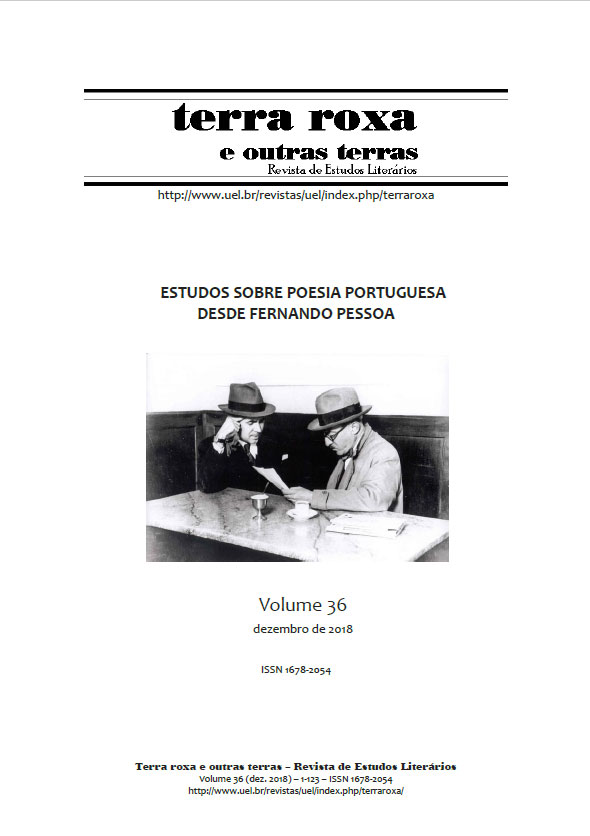Fernando Pessoa and Sophia de Mello Breyner Andresen: the "Epic of the Negative" versus the Unity
DOI:
https://doi.org/10.5433/1678-2054.2018v36p41Keywords:
Modernism, Intertextual dialogue, Negativity, UnityAbstract
Abstract: Fernando Pessoa's presence, in whatever way it existed, is unquestionable and inseparable from the establishment of Portuguese Modernism and its modernity. Launched in Lusitanian lands, the modernity will find a safe ground to be strengthened in the poetry of the great poets who idealized the Cadernos de Poesia, published in 1940. It's in them that Sophia de Mello Breyner Andresen makes her debut and, later, in 1944, publishes her first book. The writers of the 1940s still find reverberating Pessoa and presence's generation, and with it, it will maintain an intense poetic dialogue. In the books published by Sophia until the 60s, the dialogue with the Pessoan sphynx isn't exactly explicit, but rather is present in its diction and in the use of free verse, characteristics that bring it closer to the odes of the heteronymous Álvaro de Campos. Later, with Livro Sexto, in 1962, the dialogue becomes more evident and even more visible, with several poems evoking Pessoa. But if in this one the conscious of modernity establishes a negativity and an epic of the night, Sophia's poems bring light, unity, a full encounter with the real, completeness, however, don't leave absent the tragic feeling of a "divided time".Downloads
References
ANDRESEN, Sophia de Mello Breyner. Obra Poética. Porto: Assírio & Alvim, 2015.
CATÁLOGO. Sophia de Mello Breyner Andresen: uma vida de poeta. Paulo Mourão e Teresa Amado (orgs.). Exposição Biblioteca Nacional de Portugal. Lisboa: Caminho, 2011.
CECCUCCI, Piero. Trazer o real para a luz. Colóquio Letras (Lisboa), n. 176, jan./abr., pp. 15-27, 2011.
GUIMARÃES, Fernando. O Modernismo e a tradição da vanguarda. Simbolismo, Modernismo e Vanguardas. 3. ed. Lisboa: Imprensa Nacional, 2004, pp. 7-15.
LISBOA, Eugenio. O segundo modernismo em Portugal. Lisboa: Bertrand, 1984.
LOURENÇO, Eduardo. Prefácio. Para um retrato de Sophia. Sophia de Mello Breyner Andresen. Antologia. 4. ed. Lisboa: Moraes, 1975, pp. i-vii.
LOURENÇO, Eduardo. Dialética mítica da nossa modernidade. Tempo e poesia. Lisboa: Relógio d'Água, 1987, pp. 183-200.
MARTINHO, Fernando J. B. Pessoa e a moderna poesia portuguesa: do Orpheu a 1960. Lisboa: Bertrand, 1991.
MARTINHO, Fernando J. B. Modernismo português e brasileiro: olhares e escritas cruzadas. Scripta (Belo Horizonte), v. 7, n. 12, pp. 189-208, 2003. Disponível em http://periodicos.pucminas.br/index.php/scripta/article/view/12482/9795.
MARTINHO, Fernando J. B. Sophia na Grécia com Pessoa. Sophia de Mello Breyner Andresen. Actas do Colóquio Internacional. Porto: Porto, 2013, pp. 214-218.
MARTINS, Fernando Cabral. Margens portuguesas do Simbolismo. Scripta (Belo Horizonte), v. 7, n. 12, pp. 179-188, 2003. Disponível em http://periodicos.pucminas.br/index.php/scripta/article/view/12482/979.
PASSOS, Maria Armanda. Sophia de Mello Breyner Andresen: "Escrevemos poesia para não nos afogarmos no cais...". Jornal de Letras, Artes e Ideias (Lisboa), n. 26, pp. 2-5, 1982.
PAZ, Octavio. Os filhos do barro. Do romantismo à vanguarda. Trad. Ari Roitman e Paulina Wacht. São Paulo: Cosac Naify, 2013.
PEREIRA, Luís Ricardo. Sophia de Mello Breyner Andresen. Inscrição da terra. Lisboa: Instituto Piaget, 2003.
SILVA, Sofia de Sousa. Sobre Pessoa e Sophia. Revista Semear (Rio de Janeiro), nº 6, 2002. Disponível em: http://www.letras.puc-rio.br/unidades&nucleos/catedra/revista/6Sem_26.html.
Downloads
Published
How to Cite
Issue
Section
License
Copyright (c) 2019 Terra Roxa e Outras Terras: Revista de Estudos Literários

This work is licensed under a Creative Commons Attribution 4.0 International License.
Authors who publish in this journal agree to the following terms:
a) The authors retain the copyright and grant the journal the right of first publication, the work being simultaneously licensed under the Creative Commons Attribution-NonCommercial 4.0 International License, allowing the sharing of the work with acknowledgment of the authorship of the work and initial publication in this journal.
b) Authors are authorized to assume additional contracts separately, for non-exclusive distribution of the version of the work published in this journal (eg, publish in an institutional repository or as a book chapter), with acknowledgment of authorship and initial publication in this journal.
c) Authors are allowed and encouraged to publish and distribute their work online (e.g. in institutional repositories or on their personal page) after the editorial process, as this can generate productive changes as well as increase impact and citation of the published work (See The Effect of Open Access).
d) The authors of the approved works authorize the journal to, after publication, transfer their content for reproduction in content indexers, virtual libraries and the like.
e) The authors assume that the texts submitted for publication are of their original creation, taking full responsibility for their content in case of any objection by third parties.




















